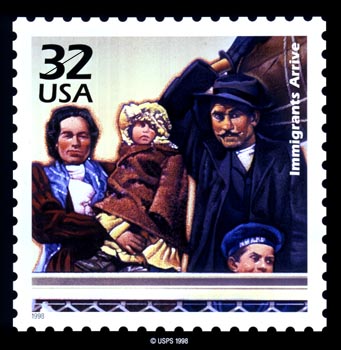To trace your immigrant ancestor back to his country or origin, follow the standard genealogy advice-- work from the known to the unknown, and work backwards. So your initial research will be in the United States.
Your goal is twofold:
- 1) to learn the original spelling of the name and
- 2) to locate the city, town or village from which your ancestor came.
A good reference book to consult:
Helpful Online Guides to Tracing Immigrant Ancestors
- A quick overview of immigration research appeared in The Source, now available online at the Ancestry.com Wiki. Notice there are links to further information in the box on the right hand corner.
- FamilySearch.org Wiki: Tracing Immigrant Ancestors -- notice it is in 3 parts.As you navigate to each part, use the outline to your right to help you navigate the various topics.
This is an excellent tutorial that you will continue to use on an as-needed basis while conducting your research.
- part 1 --a general overview of how to approach researching immigrant ancestors.
- part 2 "Country of Arrival" -- specific advice to help you find information in the United States.
- part 3 "Country of Origin" --specific advice to help you find information in the country of origin.
- Some webinars or online lessons from Family Search.org include
- Immigration: Crossing the Pond (4 pts)
-- each part is between 10 and 20 minutes. A nice, quick introduction in about an hour.
- James Tanner "Proven Ways to Find Your Immigrant Ancestor.
"
- If you have pre 20th cenetury immigrant ancestors, you will find these two webinars interesting
Finding Immigrant Origins from the Census Records
Clues from the census may take you to other information that will help you determine spelling and birthplace. For each foreign born ancestor (and collateral line) you will want to make note of the following information:
| 1820 and 1830 |
asks number of people in household “foreigners not naturalized" |
| 1850 forward |
asks place of birth for each person in household |
| 1870 |
asks if father foreign born/ mother foreign born (checkbox to left) ; also also asks if males are eligible to vote or not. |
1880 -
forward |
also asks birthplace of each person’s father and mother (1940 only for sampling) |
| 1900 |
asks year of immigration, number of years in U.S. and if a naturalized citizen, and if each person speaks English |
| 1910 |
asks year of immigration, if naturalized or alien and if each person speaks English (if not, asks the name of language spoken by the person) . |
| 1920 |
ask year of immigration to U.S., naturalized or alien? and year of naturalization. It also asks mother tongue of each person and if person can speak English. |
| 1930 |
ask year of immigration to U.S., naturalized or alien? and year of naturalization. It also asks mother tongue of each person and if person can speak English. |
| 1940 |
|
and be aware of these abbreviations: AL = Alien PA = [naturalization] Papers filed NA = Naturalized
Citizenship and public records
- Naturalization records sometimes hold little information, sometimes open up everything. In general, the later the naturalization, the better the information. See the seprate page on this site, Your Guide to Finding Naturalization Records
- Birth information may be found in WWI draft registration documents, although usually the place is not as specific as hoped for.
- Social Security applications contain the place of birth -- not just of the applicant, but also his or her parents. Again, you can only hope it will be a local place rather than a country.
- Death records and obituaries might give us a clue. Don't forget to check the death records and obituaries of sisters and brothers.
- Marriage records will sometimes include a specific place of birth.
Arrival and Settlement
- Passenger lists were filled out at the port of embarkation, so will almost always be listed by the original name of the passenger. Additionally, they may sometimes list the hometown of the passenger. Your Guide to Finding Passenger List Records
- Church records, especially if a church attended by other immigrants from the same country, may be a source of information about hometowns and other relatives or close friends, who may have come from the same area.
- Local ethnic newspapers -- usually in the language of the home country -- may be a source of information regarding hometowns.
Records from the Country of Origin
- The basic rule of genealogy is to work from the known to the unknown, so you will search exhaustively records in this country before begining research in the records of the country of origin. However... I could not resist mentioning this one resource:
- Brigham Young University Center for Family History and Genealogy has a database of records from within the county of origin that provide information about people leaving that country. Information is put into a database, which grows steadily. It is worth bookmarking and checking because even if you don't find information specific to your ancestor, the records are fascinating. See the website Immigrant Ancestors Project.
More Links
|
